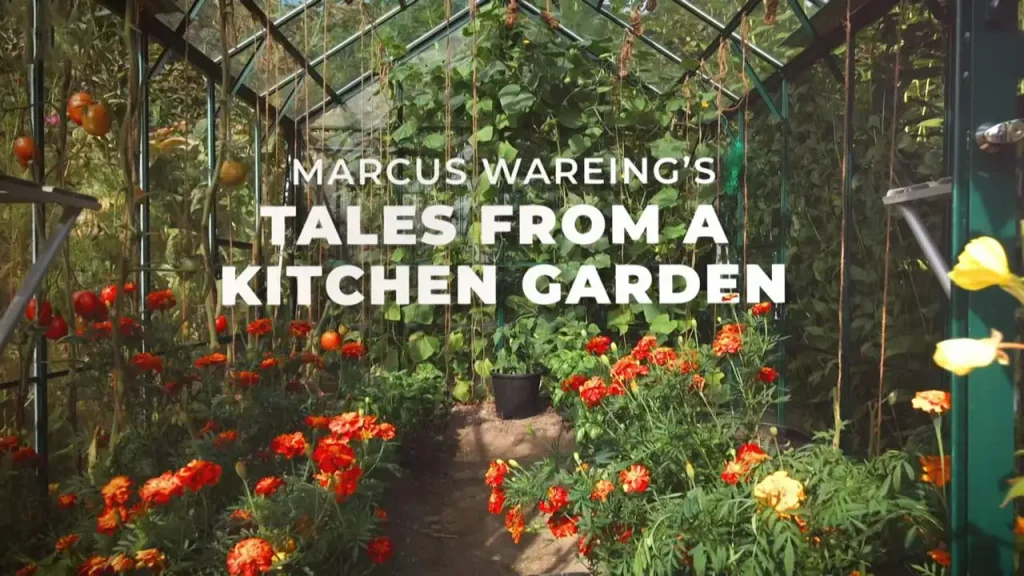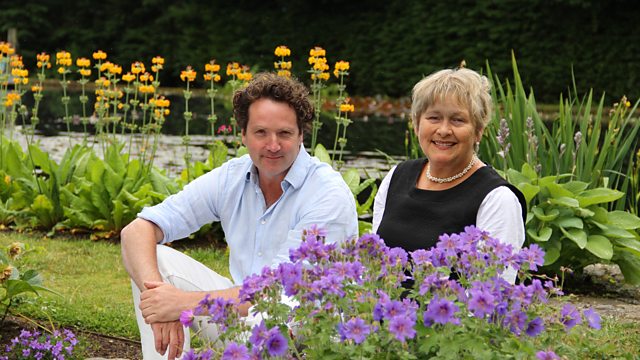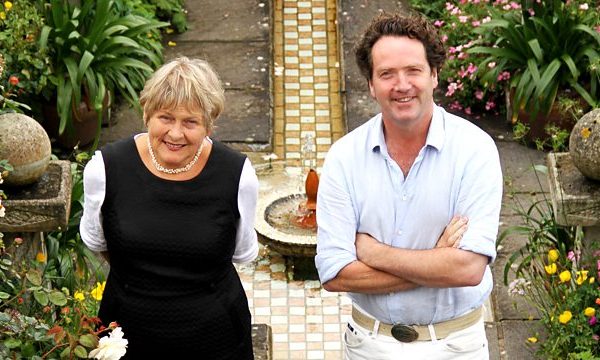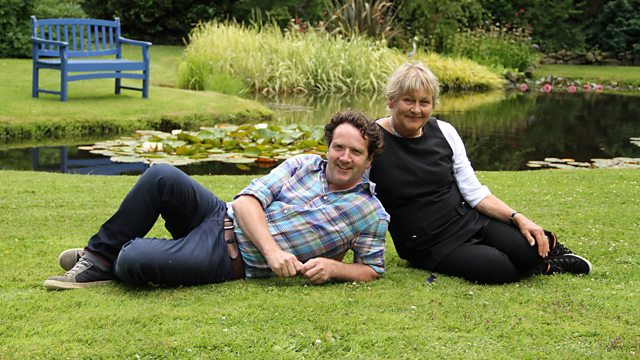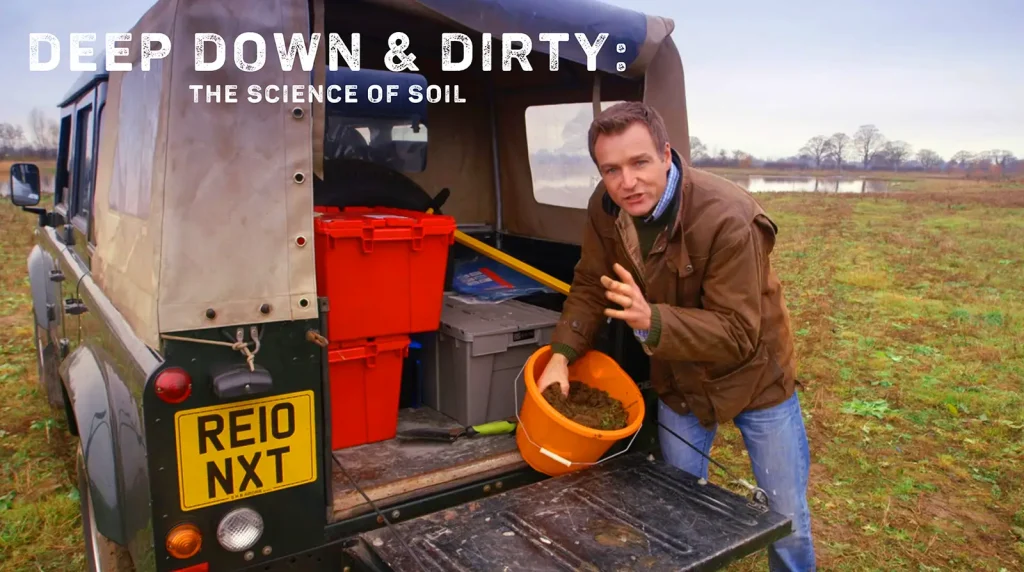Marcus Wareing’s Tales from a Kitchen Garden 2023 Episode 7 – Marcus Wareing is on a journey of discovery at his quaint Sussex smallholding. Recently, he’s noticed a growing population of deer grazing and meandering through his sprawling land. Curious and a tad concerned, Marcus is keen to understand what role, if any, he should play in managing these graceful creatures. To find the answers he seeks, Marcus embarks on an enlightening trip to the Knepp Estate. There, he meets Charlie and Issy, the visionary stewards of a massive 3,500-acre farm that has fully embraced the concept of rewilding.
In this ecological endeavor, deer aren’t just passive inhabitants; they are crucial contributors to the natural balance. Marcus learns that the deer serve as architects of biodiversity, helping to cultivate an environment that sustains an even larger array of wildlife. In an effort to maintain a healthy deer population at Knepp, Charlie and Issy also sustainably harvest venison, balancing the ecosystem while providing a nutritious food source.
Returning to his own farm, inspiration coursing through his veins, Marcus decides it’s the perfect time to broaden not only his horizons but also those of two budding chefs he’s mentoring. He invites them over for a hands-on foraging masterclass, led by none other than his expert friend, Colin Wheeler. Even Marcus, a seasoned chef, feels like an apprentice when it comes to the art of foraging. Together with the eager young chefs, Marcus is thrilled to discover a hidden treasure trove of edible plants growing organically on his property, overlooked until now.
They wander through the kitchen garden and adjoining orchard, where an astonishing bounty awaits. Fruits and vegetables flourish in abundance—more produce than Marcus and his family could ever consume. With a sense of community in mind, Marcus lovingly harvests four generous boxes of this lush produce, earmarking them for delivery to a local community kitchen that feeds the less fortunate.
Feeling profoundly inspired by his eye-opening visit to the Knepp Estate, Marcus decides it’s time to bring his newfound knowledge full circle. In a culinary celebration of nature’s richness, he meticulously prepares a mouth-watering haunch of venison. Eager to share this delicacy, he invites Anatoliy, Stuart, and Fred over for a sumptuous meal, punctuating the end of an enriching journey with a feast that encapsulates the essence of farm-to-table sustainability.
Marcus Wareing’s Tales from a Kitchen Garden 2023 Episode 7
Marcus Wareing explores new possibilities on his Sussex smallholding. He has noticed more and more deer on his land and wants to learn what, if anything, he should be doing to manage them. So, he heads to the Knepp Estate to meet Charlie and Issy, who have turned over their 3,500-acre farm to rewilding, in which deer play a vital role.
Learning About Rewilding at Knepp Estate
Arriving at the iron gates of the Knepp Estate, Marcus Wareing can’t help but feel a sense of excitement. This 3,500-acre farm in West Sussex has become a pioneering rewilding project, restoring habitats to their natural state and letting the land dictate how it wants to be managed. As Marcus drives down the long driveway lined with oak trees, he spies several fallow deer grazing in the distance. Deer have become a keystone species at Knepp, helping regenerate the landscape through their natural behavior.
Marcus is warmly greeted by Charlie Burrell and his wife Isabella Tree, who leased their conventional dairy and arable farm to Ted Green in 2001 to manage organically. But poor soils and low rainfall produced mediocre crop yields, so in 2002 they took the radical step of letting go of traditional farming methods and allowing nature to take over. Since then, wildlife has thrived, with purple emperor butterflies, turtle doves, and nightingales making a comeback. But the stars of Knepp’s rewilding success story are the free-roaming deer, cattle, pigs, and ponies, whose natural grazing and rootling have created diverse mosaics of habitat.
As Marcus and Charlie take a 4×4 safari tour around the project, Marcus asks what role the deer play in the Knepp experiment. “They’re keystone species, really,” Charlie explains. “By browsing and bark-stripping trees, the deer help to create more varied wood pasture, which benefits a huge range of insects, birds, and mammals.” But with no natural predators, Charlie has to manage the deer population through an annual cull. The venison is then sold to top restaurants like Marcus’s two Michelin star venue, The Latymer.
Sitting down to a venison stew lunch, Marcus is keen to know the most important lessons Charlie has learned from the Knepp rewilding project. “Letting go of control is never easy,” he reflects. “But allowing natural processes to shape the land has produced staggering results in just 20 years. With biodiversity in freefall globally, we need a nature-based solution for food production. I think rewilding offers a more ethical and sustainable way forward.”
A Foraging Masterclass at Home
Back at his smallholding in Sussex, Marcus has invited two apprentice chefs, Amy and Jack, for a foraging masterclass with his friend Colin Wheeler – a renowned wild food expert. Though Marcus loves cooking with wild ingredients, he’s always got a lot to learn when it comes to foraging. Examining the hedge bordering his kitchen garden, Colin points out plants like nettles, dandelion, and burdock that can be used in all sorts of inventive recipes. “Foraging connects us to nature and seasons in a visceral way,” Colin explains. “Even in an urban backyard or country hedgerow, there’s an abundance of wild food if you know what to look for.”
Amy seems hesitant at first, wary of mistakenly picking poisonous plants. But with Colin’s guidance, she begins to recognize edible species like sorrel, chickweed, and wild garlic. Marcus can’t believe how much free food is right under his nose. Wandering into a clearing, Jack spots a cluster of brown mushrooms. “Are these cepes?” he asks hopefully. Crouching down, Colin examines the underside. “Close – they’re penny buns. Still tasty!” Now brimming with foraged goodies, the group heads to the kitchen to turn their spoils into a delicious meal.
Over venison carpaccio with wild garlic pesto followed by pan-fried cepes, Marcus reflects on the foraging masterclass. “You really opened my eyes to the food growing freely all around me,” he tells Colin. “Foraging engages all the senses and makes cooking feel more meaningful. I can’t wait to keep honing my skills.” He vows to pay closer attention to the hedgerows and woods surrounding his property to discover more hidden edible treasures.
Managing the Deer Population
In the week after his enlightening visit to the Knepp Estate, Marcus notices more and more deer grazing on his land. Without predators to control their numbers, the population has steadily increased. But he’s loath to reach for the gun and organize a deer cull like Charlie carries out at Knepp.
Doing some research online, Marcus discovers alternatives like contraceptive injections, enclosure fencing, and planting unpalatable shrubs. But these options seem costly and not guaranteed to work. If he wants to foster a healthy woodland habitat on his smallholding, some level of deer management is necessary. But Marcus believes there must be an ethical, non-lethal solution.
He reaches out to Charlie, who explains the realities of controlling deer numbers in the wild. “Believe me, I take no pleasure in culling them,” Charlie says. “But they breed rapidly, stripping saplings and preventing woodland regeneration. With no natural predators here, population control is crucial for ecosystem balance.”
However, Charlie tells Marcus about innovative projects like one in Scotland where native lynx were reintroduced to help manage deer. Perhaps large predators could one day roam free in England again. Until then, Marcus accepts that a sustainable deer cull on his land will likely be needed. But he plans to have any venison humanely butchered and shared among his local community.
Hosting a Foraging Feast
Eager to showcase foraged foods, Marcus invites Colin Wheeler and some friends over for a feast. Colin arrives bearing armfuls of edible plants freshly picked from Marcus’s property – cleavers, jack-by-the-hedge, hawthorn leaves, and dandelion buds.
In the kitchen, Marcus and Colin get cooking, sautéing wild garlic and tossing shredded jack-by-the-hedge through salad leaves. Colin shows Marcus how to fry up fiddlehead ferns harvested from the riverbank for a seasonal side dish. Popping a chickweed leaf into his mouth, Marcus remarks: “The clean, bright flavors of foraged ingredients are incredible. I can really taste the essence of spring.”
When the guests sit down to eat, Marcus raises a toast – “To the bounty of Mother Nature!” The meal begins with a palate-cleansing wild nettle soup, followed by pan-seared venison loin with an elderberry sauce. Colin’s foraged sides and a dessert of rosehip sorbet with dandelion flower shortbread leave everyone feeling connected to the land.
Over coffee, talk turns to innovative conservation. Marcus’s friend Lucy explains her work reintroducing beavers to Britain to restore wetland habitats. “We need to see nature as an ally, not an obstacle,” she says passionately. The future of farming lies in working alongside ecological processes, not battling against them.” Marcus feels inspired to explore rewilding his little corner of Sussex.
Giving Back to the Local Community
Early on Saturday morning, Marcus heads out to his kitchen garden and orchard, basket in hand. After days of warm spring rain, everything is bursting into leaf and bloom. As Marcus inspects the beds and fruit trees, he’s amazed at the abundance springing forth. There are carrots, spinach, radishes, and lettuces galore. The orchard boughs droop under the weight of apples, pears, plums, and Kentish cherries. Marcus could never use it all before the produce goes off.
So he harvests four large boxes brimming with fresh fruits and vegetables and loads up his van. Marcus has volunteered to help out at the New Oak Community Kitchen in the nearby town of Horsham. Run entirely by volunteers, the community kitchen provides free, nutritious meals to people going through hard times, as well as running cooking classes for low-income families.
Arriving with his crates of garden-fresh produce, Marcus receives a warm welcome from the charity’s coordinator, Fiona. She gives him a tour of the kitchen, where volunteers are chopping, simmering, and laughing. The smell of a big batch of carrot and coriander soup fills the air. Marcus unpacks his harvest boxes to gasps of delight from the volunteers. “This bounty will help stretch our budget and make so many nutritious meals!” Fiona exclaims.
As a thank you, Marcus finds himself cajoled into donning an apron and helping serve up lunch. Seeing the grateful smiles on faces young and old as they tuck into hearty bowls of soup and salad makes his heart swell. Driving home afterwards, Marcus feels his kinship with the local community renewed. It may just be a small act, but sharing the produce of his land with others in need has filled his soul with joy.
Conclusion
This episode of Marcus Wareing’s Tales from a Kitchen Garden has shown the life-enhancing magic that can happen when we form a deeper connection to nature, food, and community. By embracing the possibilities of rewilding, foraging, and sustainability, Marcus discovered new purpose and meaning in the management of his smallholding and its bountiful produce.
His visit to pioneering Knepp Estate opened Marcus’ eyes to the vital role deer and other animal species can play in regenerating landscapes when allowed to behave naturally. Seeing Charlie and Isabella let go of control and let nature take charge inspired Marcus to take a more ethical, ecologically-minded approach on his own land.
Learning when to intervene and when to let go will be an ongoing journey. Managing the deer population will require sensitive solutions that consider herd health and biodiversity. Hosting friends for a forage-to-feast dinner cultivated a profound appreciation for nature’s seasonal gifts. And sharing his kitchen garden’s spring abundance with a local community kitchen nourished connections between people and the land that feeds them.
This episode illuminated the symbiotic relationship between human and ecological communities. By valuing the welfare of the land and wildlife, our own lives are enriched with meaning, health, and belonging. Marcus discovered that nurturing nature’s innate wisdom promises a bountiful future for all.
Frequently Asked Questions
What is the Knepp Estate known for?
The Knepp Estate is a pioneering rewilding project in West Sussex, England. Owners Charlie Burrell and Isabella Tree have allowed the land to dictate how it wants to be managed rather than imposing traditional farming methods. Free-roaming cattle, ponies, pigs, and deer have naturally regenerated the landscape, bringing back endangered species. Knepp shows the power of a nature-based approach to food production and conservation.
Who is Colin Wheeler?
Colin Wheeler is a wild food expert and foraging guide who led a masterclass for Marcus Wareing and two apprentice chefs. He taught them how to identify edible plants commonly found in hedgerows, woods, and urban areas. Colin is passionate about connecting people to nature through foraging and using wild ingredients in recipes.
How can deer populations be managed ethically?
With no natural predators in England, deer can overgraze landscapes and damage new tree growth. Completely non-lethal options like contraception or fencing are often costly and not foolproof. Therefore, an annual sustainable deer cull may be needed for a healthy ecosystem balance. More ethical solutions could involve reintroducing predators like lynx to naturally manage deer herds.
What kind of meals were cooked during the episode?
Dishes cooked included venison stew, venison carpaccio with wild garlic pesto, pan-fried cep mushrooms, nettle soup, pan-seared venison loin with elderberry sauce, and rosehip sorbet with dandelion shortbread. Colin Wheeler’s foraged ingredients like chickweed, cleavers, and fiddlehead ferns were also incorporated.
What community initiative did Marcus Wareing support?
Marcus donated four boxes of freshly harvested produce from his kitchen garden to New Oak Community Kitchen. This volunteer-run charity provides free, nutritious meals and cooking classes to people facing hardship in the local area. Sharing the abundance from his land nourished community connections.
